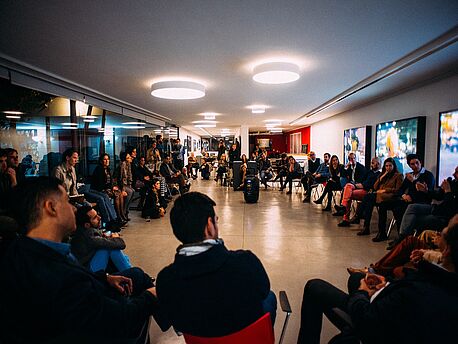Upcoming events
09/15/2025 - 09/18/2025
TU-Campus EUREF, EUREF-Campus 9, 10829 Berlin-Schöneberg
Conference
BIFOLD Summer School on Artificial Intelligence and Society
The Summer School invites researchers and practitioners to explore the space of 'Open Science & Open Data'. Join us as we explore key intersections of openness and AI.
10/16/2025 - 10/17/2025
Workshop
Workshop on Critical Theory of the Computational
This international workshop—organised by Center for Critical Computational Studies (C3S), Center for Responsible AI Technologies and the Weizenbaum Institute—aims to use critical theories in order to explore how digital and computational systems are influencing societal changes and how these systems…
11/06/2025
09:30 AM - 04:00 PM | online
Workshop
News
Call for Participants
Digitalisation Research and Network Meeting (DigiMeet 2025)
The Bavarian Research Institute for Digital Transformation (bidt), the Center for Advanced Internet Studies (CAIS), the Leibniz Institute for Media Research – Hans-Bredow-Institut (HBI), and the Weizenbaum Institute (WI), invite doctoral and postdoctoral researchers to present their work at the…
Unsere Veranstaltungsformate
![[Translate to English:] [Translate to English:]](/media/_processed_/7/e/csm_Conf23_web_3b8384c77d.jpg)
![[Translate to English:] [Translate to English:]](/media/_processed_/f/8/csm_Debate_Allgemein_38f4c788f3.png)

![[Translate to English:] [Translate to English:]](/media/_processed_/1/b/csm_Pizza_und_Cybersicherheit1_fe09b4b400.jpg)
![[Translate to English:] [Translate to English:]](/media/_processed_/1/b/csm_citizen4_124b3d00cc.jpg)

Past Events
07/02/2025
06:00 PM -
08:00 PM
|
Weizenbaum-Institut,
Hardenbergstraße 32,
10623 Berlin
Movie
Book Presentation
Panel Discussion
ABGESAGT: Meinungsbildung und soziale Medien
Die Veranstaltung ist abgesagt. Einen neuen Termin geben wir in Kürze bekannt.
06/30/2025
06:00 PM - 08:00 PM | Weizenbaum Institute, Hardenbergstraße 32, 10623 Berlin
Talk
THE AI CON: How to Fight Big Tech's Hype and Create the Future We Want
Presenting her groundbreaking new book co-authored with Emily M. Bender, “THE AI CON: How to Fight Big Tech's Hype and Create the Future We Want”, Alex Hanna unpacks the myths and marketing that surround today’s AI discourse, offering a sharp critique of the tech industry's narratives. Complementing…
06/24/2025
11:30 AM - 01:00 PM | Weizenbaum-Institut, Hardenbergstraße 32, 10623 Berlin
Lecture
Why media companies now insist they are media companies, and why that matters
Debates on regulating social media often center on whether platforms are tech firms or media companies. In her presentation, Robyn Caplan shows why this is relevant.
06/18/2025
02:00 PM - 03:30 PM | online
Panel Discussion
Die KI-Verordnung und generative KI
In der fünften Ausgabe unserer Dialogreihe „KI-Verordnung: Wege zur Umsetzung“ schauen wir uns sogenannte Allzweck-KI-Modelle an, da die Verordnung erstmals spezifische Vorgaben für deraratige Modelle enthält.
06/10/2025
06:00 PM - 07:30 PM | online
Weizenbaum Forum
Ein Ökosystem für KI-Rechenschaftspflicht? Zwischen Evaluation, Audit und Zertifizierung
Mit dem AI-Act der Europäischen Union gewinnen Fragen zur Verantwortung und zur regelmäßigen Überprüfung von KI-Systemen zunehmend an Bedeutung. Wie kann ein vertrauenswürdiges Audit- und Zertifizierungssystem gestaltet werden, das sowohl technische Standards erfüllt als auch gesellschaftlichen…
06/04/2025 - 06/05/2025
bUm – Raum für soziales Miteinander, Paul-Lincke-Ufer 21, 10999 Berlin
Weizenbaum Conference
Empowering People in Online Spaces: Democracy and Well-being in Digital Societies
This year's Weizenbaum Conference seeks to highlight theoretical and empirical research approaches focused on empowering people’s agency within online environments at both personal and collective levels. Ultimately, we would like to connect research that engages with the interface of digital…
05/22/2025
04:00 PM - 06:00 PM | Weizenbaum Institute, Hardenbergstraße 32, 10623 Berlin
Panel Discussion
Sustainable AI: Narratives and Impacts
Can AI really help save the planet—or is it just another resource-hungry illusion? Join us as we explore the promises, pitfalls, and real-world impacts of "sustainable AI." Together with Paris Marx and Paul Schütze, we’ll question the dominant narratives and uncover whether this revolutionary…
05/19/2025
07:00 PM - 10:00 PM | Weizenbaum-Institut, Hardenbergstraße 32, 10623 Berlin
Panel Discussion
AI for Bad: Risiken von generativer KI im Kontext von Wahlen
In dieser interdisziplinären Podiumsdiskussion erörtern wir mit Expert:innen aus Zivilgesellschaft, Praxis und Wissenschaft die Herausforderungen sowie mögliche regulatorische Ansätze im Umgang mit KI-generierten Bildern. Ausgangspunkt sind zwei aktuelle Studien zur Verbreitung KI-generierten…
05/14/2025
06:00 PM - 07:30 PM | Walter Hallstein Institute Library – Humboldt University Berlin, Room No. 101, Unter den Linden 6
Panel Discussion
Content Moderation and Freedom of Expression between Oligarchy and Populism
Panel discussion with Prof. Paolo Carozza, Co-Chair of the Oversight Board and Professor of Law and Political Science at the University of Notre Dame.
05/14/2025
04:00 PM - 05:30 PM | Weizenbaum-Institut, Hardenbergstraße 32, 10623 Berlin
Lecture
AI, insurance, discrimination and unfair differentiation: analysis and survey results
This talk by Prof. Zuiderveen Borgesius explores how Artificial Intelligence (AI) is transforming the insurance industry, focusing on two emerging trends: data-intensive underwriting and behaviour-based insurance.
05/13/2025
06:00 PM - 07:30 PM | online
Weizenbaum Forum
Ethische KI von der Theorie zur Praxis: (Wie) können wir verantwortungsvolle und gerechte KI erreichen?
Künstliche Intelligenz wirft drängende ethische Fragen auf, die neue Antworten verlangen. Dieses Weizenbaum Forum bringt feministische und dekoloniale Perspektiven zusammen, um Verantwortung, Gleichheit und Gerechtigkeit im Einsatz von KI zu beleuchten.
04/16/2025
05:15 PM - 09:00 PM | Weizenbaum-Institut, Hardenbergstraße 32, 10623 Berlin
Book Presentation
CANCELED: Seeing Like a Platform. An Inquiry into the Condition of Digital Modernity
The proposition at the heart of the book “Seeing Like a Platform” by Petter Törnberg and Justus Uitermark is that the digital era into which we are entering signifies the rise of a new epistemology of power.
04/15/2025
06:00 PM - 07:30 PM | Weizenbaum-Institut, Hardenbergstraße 32, 10623 Berlin
Panel Discussion
Weizenbaum Report 2025: Politische Partizipation in Deutschland
Seit 2019 wird am Weizenbaum-Institut in Kooperation mit der Freien Universität Berlin jährlich eine repräsentative Bevölkerungsbefragung zur politischen Partizipation in Deutschland unter den Bedingungen der Digitalisierung durchgeführt. Im Rahmen eines Vortrags mit Podiumsdiskussion werden nun…
04/11/2025
02:00 PM - 05:30 PM | Weizenbaum-Institut, Hardenbergstraße 32, 10623 Berlin
Wie GenAI und Process Intelligence das Prozessmanagement revolutionieren
Wie können Generative Künstliche Intelligenz (GenAI) und moderne Process-Intelligence-Ansätze das Prozessmanagement revolutionieren? Das diskutieren wir in diesem Expertenforum im April.
04/10/2025
09:30 AM - 06:00 PM | Weizenbaum Institute
Conference
Who Owns Free Knowledge? Examining Power, Platformization, and the Promise of the Commons.
This conference hosted by the Weizenbaum Institute and Wikimedia Deutschland brings together scholars and practitioners to discuss the power structures shaping free knowledge today and to explore pathways toward more equitable and inclusive knowledge ecosystems.
04/08/2025
06:00 PM - 07:30 PM | Online
Weizenbaum Forum
Digitale Souveränität in der Krise? Wie geopolitische Machtverhältnisse globale Plattformen beeinflussen
Aktuelle Ereignisse, wie die erneute Amtseinführung von Donald Trump, verdeutlichen, wie schnell digitale Plattformen auf politischen Druck reagieren. So stellte Meta die Zusammenarbeit mit Faktenprüfer:innen ein, lockerte seine Hassrede-Richtlinien und verlegte sein Moderationsteam nach Texas – ein…
04/07/2025
06:00 PM - 08:00 PM | Weizenbaum-Institut, Hardenbergstraße 32, 10623 Berlin
Book Presentation
Sisyphos im Maschinenraum - Eine Geschichte der Fehlbarkeit von Mensch und Technologie
Buchpräsentation und Gespräch mit Martina Heßler.
03/26/2025
02:00 PM - 03:30 PM | Online
Panel Discussion
Vorbereitung und Umsetzung der KI-Verordnung in der Wirtschaft
Welche Herausforderungen begegnen Unternehmen? Mit welchen praktischen Instrumenten können sie unterstützt werden? Wie steht es um die Umsetzung der KI-Verordnung nach der Bundestagswahl und was kann die Politik tun, um den Prozess für Aufsichts-, Prüfbehörden und Unternehmen nutzerfreundlicher zu…
03/25/2025
10:00 AM - 08:00 PM | Weizenbaum-Institut, Hardenbergstr. 32, 10623 Berlin
Symposium
Yes, we are open! Künstliche Intelligenz verantwortungsbewusst gestalten
Wie können Künstliche Intelligenz und offenes Wissen einander stärken? Welche Rahmenbedingungen braucht es, damit KI fair, nachhaltig und sozial verantwortlich gestaltet wird? Das diskutieren wir am 25. März 2025.
03/19/2025 - 03/21/2025
Freie Universität Berlin, Weizenbaum-Institut
Conference
Das Weizenbaum-Institut auf der DGPuK-Jahrestagung
Vom 19. bis 21. März findet die 70. Jahrestagung der Deutschen Gesellschaft für Publizistik- und Kommunikationswissenschaften an der FU Berlin statt. Weizenbaum-Forschende und Fellows sind Teil des Programms.
03/11/2025
06:00 PM - 07:30 PM | online
Weizenbaum Forum
ChatGPT: Wie veränderst du die Wissenschaft?
Seit der Veröffentlichung von ChatGPT im November 2022 ist eine Diskussion darüber entbrannt, welche Folgen die Entwicklung von generativer KI für die Wissenschaft haben wird. Wann darf und sollte KI genutzt werden, welche Fähigkeiten zur Nutzung sollten Wissenschaftler:innen mitbringen und wie…
03/06/2025
05:30 PM - 09:00 PM | Weizenbaum-Institut, Hardenbergstraße 32 / 10623 Berlin
Panel Discussion
Bits & Bäume Policy Lab - Digitale Souveränität für eine wehrhafte Demokratie!
Das Bits&Bäume-Bündnis lädt zum Diskussionsabend über resiliente digitale Infrastrukturen ein.
03/04/2025 - 03/05/2025
St Anne's College, Oxford
Conference
How digitalisation shapes Elections and Democracies
This joint event of Weizenbaum Institute (WI) and Oxford Internet Institute (OII) will take place on 4-5 March 2025 in Oxford. In addition to four panels on the effects of digitalisation on elections 2024 and democratic processes in general, Prof. Ralph Schroeder takes a closer look on online…
02/13/2025
06:00 PM - 09:00 PM | Weizenbaum-Institut, Hardenbergstr. 32, 10623 Berlin
Movie Night
Panel Discussion
Watching You – Die Welt von Palantir und Alex Karp
Screening des Dokumentarfilms von Klaus Stern zu den Entwicklungen und Kontroversen rund um das Unternehmen Palantir und dessen CEO und Gründer Alex Karp. Im Anschluss diskutiert der Regisseur mit Lena Ulbricht, Constanze Kurz und Simon Egbert über die gesellschaftlichen Auswirkungen von…